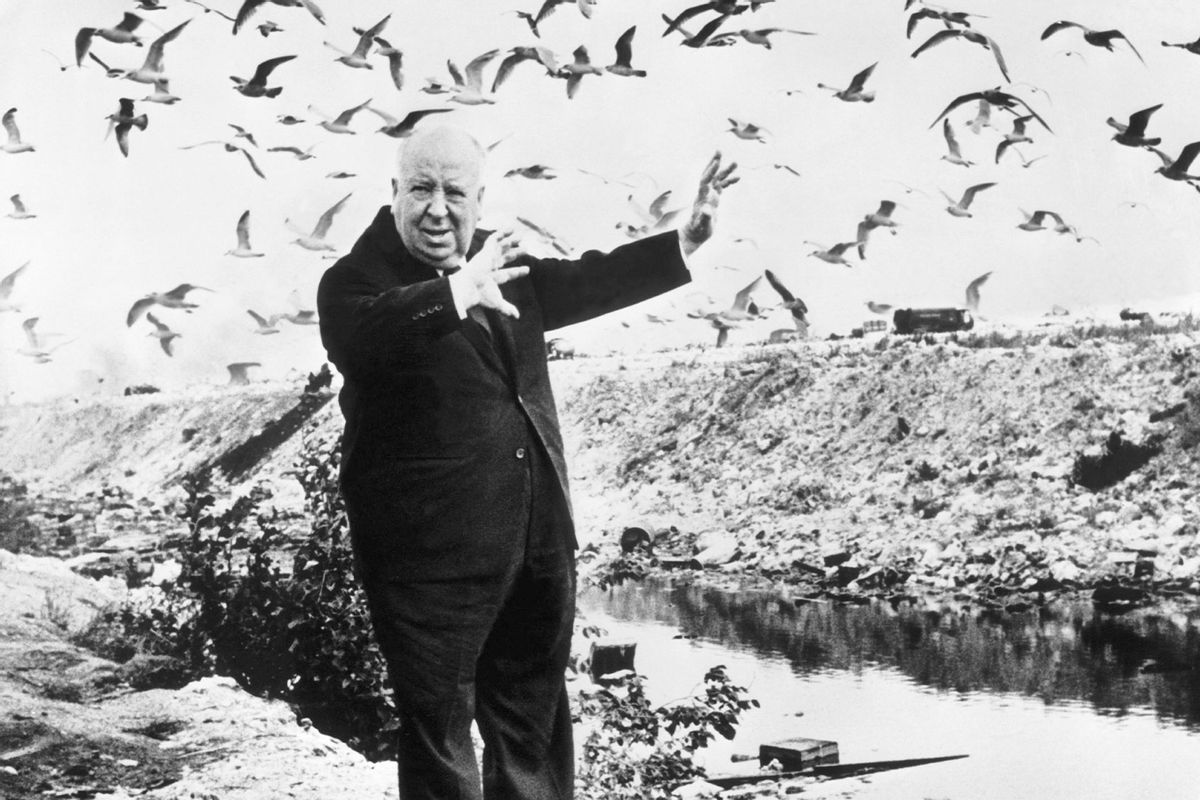In Universal's new DVD of Alfred Hitchcock's "Marnie," film critic Robin Wood -- who has done some of the best critical writing on Hitchcock -- describes the director as the most "artificial" of filmmakers. Certainly that's true of 1963's "The Birds." Hitchcock often said that he planned his films so thoroughly in advance that shooting them was almost an afterthought. Both "The Birds" and "Marnie" are too deliberately constructed to provide any possibility of invention or spontaneity. Humor has been banished from the films (relegated, it seems, to the director's rather strained trailer, included on the DVD). We're watching a plan being worked out. And perhaps that strict adherence to plan explains why Hitchcock would allow Rod Taylor and Tippi Hedren to get away with such stilted dialogue and wooden acting.
There are all sorts of complaints to be lodged against "The Birds." The trouble is, those complaints don't do anything to diminish the fact that the film is terrifying. Fellini called it an "apocalyptic poem." He wasn't so wrong, although whether we're actually seeing the end of the world remains ambiguous, and that ambiguity is the chief source of the film's terror. Hitchcock introduces all sorts of reasons why the birds may be attacking (wreaking revenge for humans' treating them as prey; acting as harbingers of the apocalypse; exacting payment for the sins of the characters), only to allow us to discard each one. What we're seeing is nothing less than the full-blown chaos of nature. And the only adequate response is the open-mouthed shock that we see on Jessica Tandy's face when she encounters a neighbor whose eyes have been pecked out. By the agonizingly drawn-out climax, with the characters barricaded in their house, we're watching people reduced to Norman Bates' definition of the human condition: "We're all in our private trap. We scratch and claw, but only at the air, only at each other."
Like every Hitchcock film that Universal has released on DVD ("Psycho" and "Vertigo" among them), "The Birds" is an absolutely fabulous package. (Memo to Universal: Hope you guys give this deluxe treatment to the remake of "The Man Who Knew Too Much.") The scenes of Hedren's screen test (done with actor Martin Balsam in a reenactment of scenes from several Hitchcock films) suggest the stiffness that hinders her performances. Her reminiscences during the documentary reveal a warmer, more likable presence. (To be fair, she is playing a cold character here.) She's frank about her rumored mistreatment at the hands of the director (which seems less deliberate than clueless on Hitchcock's part), and is still obviously fond of him on some level. The documentary, which includes observations from other members of the cast and crew, as well as comments from critic Wood and Hitchcock's daughter Pat, provides some fascinating glimpses into the process of making the film without becoming needlessly technical. Seeing how the shots were put together enhances their artificiality but somehow makes them even more effective. The things that can be achieved today with computer-generated images are so realistic that they can't help appearing fake, while the artfully faked special effects of previous generations still retain an imagistic power that takes root in our imagination.
Nowhere is that more in evidence here than in the final shot. Composed of 32 separate pieces of film, it's the zenith of both the film's technical accomplishment and its unnerving ambiguity. There are no closing titles, not even "The End" -- just the characters driving toward a breaking sunset, surrounded by birds that may have reached the end of their murderousness or that are merely massing for the next frenzy. "The Birds" infects your dreams because, unlike other horror films, it offers no catharsis and no resolution.
Hitchcock leaves us teetering on the edge of the abyss and then returns us to our everyday life. Coming after "Psycho," which plunged into that abyss, it's tough not to conclude that Hitchcock thinks that precarious balance is as close to safety as this world allows us to be.



Shares